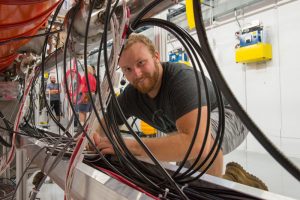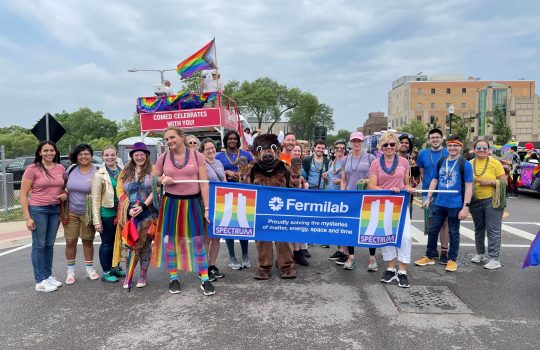Fermilab has expanded its VetTech internship program, seeking out veterans for technical and computing positions across the laboratory.
When the U.S. Department of Energy’s Fermilab needed to hire new technicians for jobs across the laboratory, they knew exactly where to look.

Frederick Davis, one of the 2018 VetTech interns, works in the calibration shop at Fermilab. Photo: Reidar Hahn
“Military veterans have a fantastic work ethic,” said Aria Soha, technical program manager for Fermilab’s VetTech internship program. “Their troubleshooting skills are unparalleled, they know how to work under pressure, they’re good at thinking on their feet. All the things you want in a good technician.”
That’s the guiding philosophy behind the program, now in its third year. The VetTech internship is open to military veterans of all stripes and places those veterans in a wide range of technician jobs, from mechanical to electrical to computing and software development. The hope, say the program’s administrators, is that they will find the right people to fill these jobs permanently, and so far, that has been happening.
“The VetTech program connects veterans with the brilliant minds at Fermilab, America’s premier particle physics laboratory, and provides them an opportunity to apply their impressive skill sets for science and innovation,” said U.S. Secretary of Energy Rick Perry. “In addition to creating a workforce development opportunity for our nation’s veterans, this collaboration equips the lab with the knowledge and expertise these veterans have learned during their service, providing a unique perspective to tackling some of our country’s toughest scientific challenges.”
The VetTech program, the brainchild of Fermilab Neutrino Division Head Steve Brice, began in 2016 as a partnership with College of DuPage, offering internships to veterans who were students working on technical degrees. That first year saw four students given internships, two of whom were hired on full-time. The second year, the program was expanded to include computing disciplines and other colleges, and this year, Fermilab has further widened the program, reaching out not only to community colleges, but also to veterans groups within a 50-mile radius around the laboratory. The result: More than 50 veterans applied for the program this year, 12 of whom were brought aboard as interns. That’s more than the past two years combined, according to the program’s administrators.

Erik Dopp is one of the first VetTech interns and now a full-time Fermilab employee. Photo: Reidar Hahn
“Awareness of the program has been growing,” said Sandra Charles, Fermilab’s talent acquisition, diversity and inclusion manager. “In 2018 we went broader, doing a lot of outreach. We want to drum up more exposure and have this community become more aware of who we are, of our interest and of our understanding of the value they bring to the United States, and to the lab as well.”
Mario Lucero, Fermilab diversity and inclusion specialist, agrees, noting that the laboratory has a small but strong veteran community that is fully behind the VetTech effort.
“It’s of great benefit to the lab to bring in veterans,” he said, “since they have the training we value in technical work and the commitment. They bring a lot of the talent that we’re looking for, and their skills are adaptable for what Fermilab needs.”
Frederick Davis, a student at Joliet Junior College working toward a mechanical engineering degree, was one of the 2018 VetTech interns. Davis joined the U.S. Navy at 19 and spent the next four years working as an engineman on a ship, working with valves, pumps, piping systems and air compressors. He was eventually put in charge of the calibration shop on his vessel, working to test and calibrate gauges and valves and repair them if necessary. That experience helped him find his place at Fermilab, in the lab’s own calibration shop.
“I heard about VetTech in school,” Davis said. “I was intimidated at first when I drove in and saw Wilson Hall and saw how amazing everybody here is, what people are capable of. I had no idea what a neutrino was or anything like that, so when I first got here I was mind-blown. But everyone has been very helpful.”
Davis has fit right in at Fermilab, and the laboratory plans to work with him as he completes his degree, offering him flexible hours and keeping him part of the Fermilab family. Charles said this flexibility is available to any VetTech intern who wants to stay and does a good job.
“We will work to find ways to keep them engaged,” she said, noting it is the same with all of the pipeline internship programs the lab offers.
Alexandra Baran is studying materials science and engineering in her fifth year at the Illinois Institute of Technology. She served in the Marine Corps from 2007 to 2012 as an airframe mechanic, and she says her military experience taught her not only valuable technical skills, but also the importance of a good work ethic and caring for one’s colleagues. As a 2018 VetTech intern working in the lab’s Neutrino Division, Baran said she put all those skills to good use.
“This was the first time I had been to Fermilab,” she said. “You get exposed to so much, to so many people who know so much. There’s a lot to learn here that you can’t learn from a textbook, and people are so willing to teach.”
The VetTech program administrators say the program will continue to expand, with plans in the works to further reach out to female veterans.
“I think it’s important as a national lab, as Americans, to employ veterans,” Soha said. “We owe these people a debt of gratitude for the sacrifices they made, and it would be ridiculous not to take advantage of the skill sets they have. It’s a win-win.”
Read more about the VetTech program here.
DOE’s Office of Science is the single largest supporter of basic research in the physical sciences in the United States, and is working to address some of the most pressing challenges of our time. For more information, please visit science.energy.gov.



